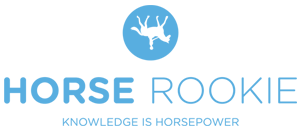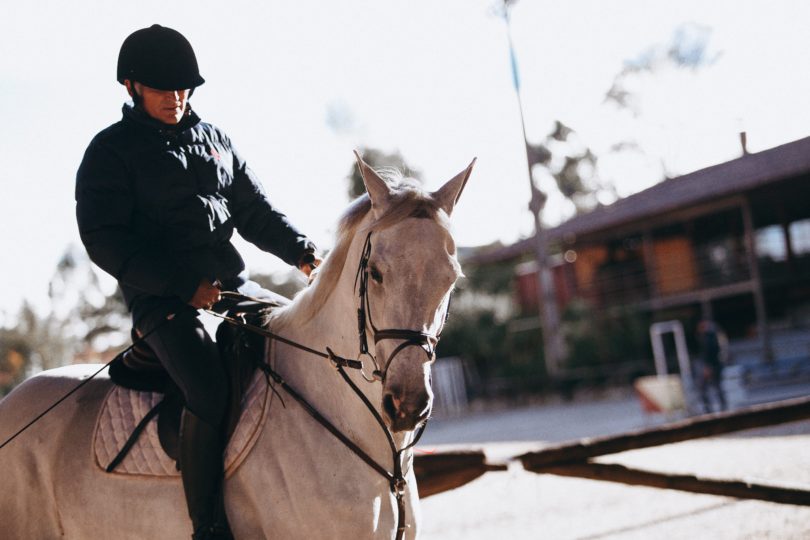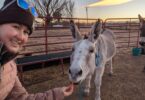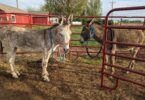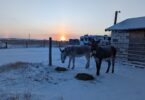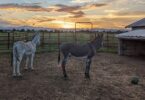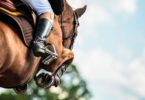3 steps towards a calmer ride
I have a confession to make. Though I have been around horses for more than twenty years, I still deal with fear frequently. I’m not afraid of the horse itself — I’m afraid of what might frighten my mount.
Knowing full-well that they are reactive animals, experienced riders often subconsciously scan the surrounding environment for what might spook the horse or cause a dangerous situation.
But here’s the thing: worrying about what might be a problem can create a problem.
A trigger is any thought, situation, or issue that automatically induces fear or anxiety in a horse rider’s mind. Our job, as equestrians, is to manage our own personal triggers so that our horses do not feed off our negative thoughts and feelings.
Fear of Fear Itself
One of my biggest fears is indoor arenas, which is hilariously ironic, considering how much it rains here in the Pacific Northwest. As a young rider, I rode a horse that spooked during most of our indoor arena lessons. Not little spooks either — full-blown gallops around and around the arena that weren’t nearly impossible to manage.
While I learned a lot from those spooks, and developed a really good seat, I also picked up a lingering mental trigger of indoor arenas. Needless to say, my first ride on a different horse in an indoor arena reflected that. Until I realized how much I was tensing up and letting my nerves take over, I couldn’t allow any other horse the chance to be fully relaxed indoors.
All horses will be afraid of something at some point, and we cannot control exactly what will scare them.
What we can control is our own fears, our personal triggers, past experiences or destructive imaginations that wreak havoc on our conscience and manifest in our bodies.
In the same way that we might be lopsided in our riding seat, we can throw our horses off with our internalized fears, too. Furthermore, in the same manner that we could blame our horse for favoring their left side until we realize the next three horses we ride also favor the same side, we might be blaming our horses for the fears we induce in them.
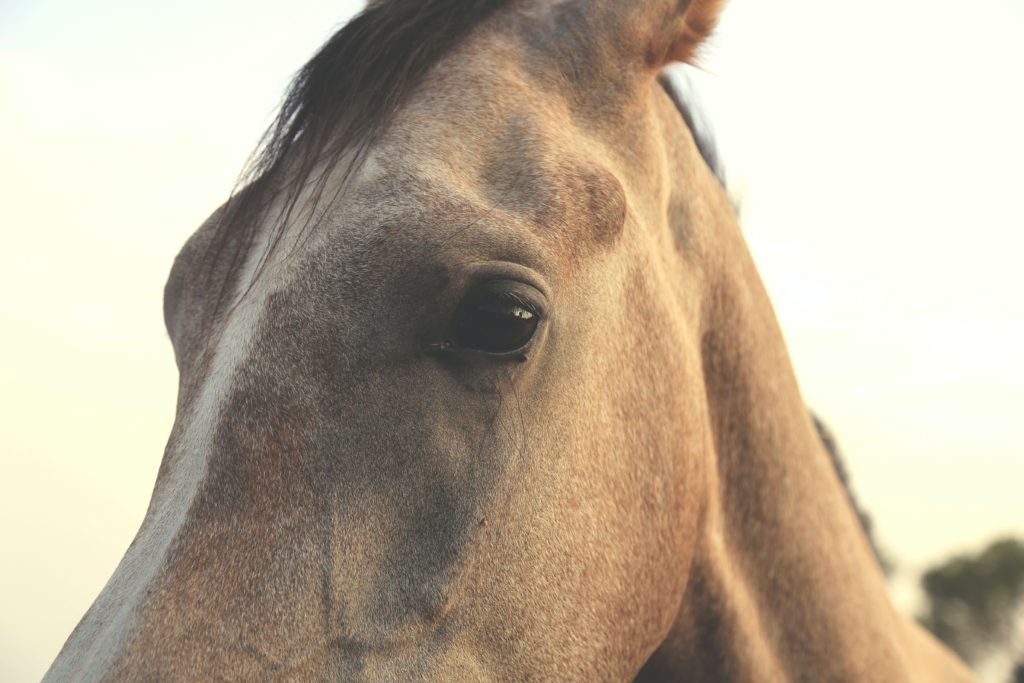
Photo Credit: Pexels
Horses are so tuned into us when we ride them, not only because their physicality is affected by ours, but also because they read and react to our emotions at a deeply intuitive level. We need to address our internalized fear to help ourselves and our horse feel as confident as possible.
If I presume that a horse is going to be jumpy and flighty in the indoor arena, despite no evidence of it, my own nerves caused by that trigger can drastically increase the chance that my horse will also be nervous. Just like that, my fear has created a self-fulfilled prophecy.
Whatever your personal triggers, there are ways to keep them from becoming your horse’s triggers.
Keep your mind and heart positive by following these steps.
- Develop a Determined Mindset: The first step is to decide your outcome as soon as you realize you have a trigger in the situation. Your fear is already telling you the worst outcome, so you have to turn the tables and decide on the best possible outcome — a confident horse and rider duo navigating the situation with ease. (Our all-time favorite mindset book is Brain Training for Riders.)
- Identify and Process Your Emotion: Ask yourself what scares you, or what you think will scare your horse. If you’re a verbal processor, share it with your trainer, a friend, or talk aloud to your horse. Get those emotions out in the open! You’ll be surprised how much this helps you move forward. Initially, it will dismiss the irrational or highly improbable fear. Then, you will be able to set in your mind how to deal with your fear should it ever come to pass.
- Be Who Your Horse Needs You To Be: Once you’ve expressed your fear and made your contingency plan, let your emotion go. It’s time to be who your horse needs you to be. Instead of worrying about what could trigger your horse, be calm, present, empathetic, and encouraging. All of these things inspire your horse’s confidence in you as the leader, allowing him to be relaxed enough to learn and get down to work.
Frequently Asked Questions
What are some tips for horse rider stress management?
Stress is a normal part of life, but excessive or chronic stress can really put a damper on your horse-riding enjoyment. Many individuals are nervous about riding horses or become stressed when learning or performing is not going as well as planned.
If you’re feeling stressed there are a few things you can do:
- Try to refocus on the things that are truly important. Make yourself lists and take the time to organize your thoughts so that you’re not worried about forgetting something. If you’re showing, the last thing you need to worry about is if you packed all your gear. Make a list, check it off, and you’ll know you’re set!
- If you’re worried about who’s watching or what could go wrong, try to refocus on the now. Worry about grooming if you’re grooming, worry about the test prep when you’re prepping, and worry about the action you are supposed to be doing when you’re supposed to be doing it. By practicing this you can get better at compartmentalizing instead of becoming overwhelmed and burning out.
- You should also practice controlling your breathing, learn to take breaks, and also learn to limit yourself. It can be difficult to say no or to decrease the amount of work you’re doing but taking on too many responsibilities and comparing yourself to others is a recipe for disaster.
Finally, if your stress and anxiety is consuming your life, you should consider stepping it up a notch and trying a therapy journal or seeking professional help. There are professionals that can help you learn to control your anxiety and lower the amount of stress in your life and are well worth trying before you give up altogether.
What do horses and humans have in common?
Horses and humans are incredibly different, but despite that we DO have quite a few similarities! We are both mammals, have many similar bones that are set up alike, and our digestive system also has many of the same parts (unlike humans and cattle).
Both equine and human genomes have been decoded and scientists have noticed that large chunks of our chromosomes are very similar. There are 90 genetic diseases that are also similar, which can help find cures for both species.
If you look beyond the physical, we still have similarities. We’re both social and live in groups. We love our families and make friends and enemies. Horses and humans can even both interpret each other’s emotions, bond, and communicate in certain ways!
How do I know if my horse is happy?
Every horse owner wants the satisfaction that their horse is happy with life, but what should you look for? It’s not like horses can speak. Horses rely on body language to communicate and a relaxed horse is a happy horse.
All parts of their body should appear soft and lack the tension you might see when they’re nervous – nostrils, lips, eyes, and movements. Anxious horses may forcefully swish their tail, stomp, and show tension in their eyes, lips, and muzzle. A relaxed horse may gently swish their tail occasionally or let it hang.
Their lips and jaw will likely be loose or even drooping. Equine facial expressions are very complex, but also very straightforward. Oftentimes a human can look at their face and understand their feelings.
If your horse LOOKS happy, she probably is. Good job!
If she’s turned out with a friend you may see playing, mutual grooming, and sharing of hay and water. If she’s stalled and happy you won’t see her pacing or weaving, since those are both signs of stress.
Some less talked about signs of happiness and relaxation include regular pooping and letting their penis drop. A horse will often hold feces in when they’re stressed or experience looser stools when super stressed, so normal and uninhibited bowel movements are fantastic! Geldings and stallions will sometimes let their penis drop down a bit when they’re content, so it’s a good sign that your boy is happy.
While riding you may hear gentle snorting as they breathe which lets you know they’re relaxed and enjoying themselves. Their tails will gently sway back and forth and lack the irritated or tense swishing you see when they are upset or concentrating intensely (we all know concentrating reeeeally hard on something can be emotionally difficult).
Can a horse colic from stress?
Yes, stress can cause colic in horses. When horses are experiencing stress the levels of cortisol in their bodies rises. While cortisol is an important hormone, too much can lead to problems.
One big problem is that it suppresses the immune system and a compromised immune system can lead to a higher chance of contracting disease. Studies have shown that abnormally high levels of cortisol is correlated with increased likelihood to colic. In addition, higher levels of cortisol detected when a horse was admitted for colic was linked to the horse’s chance of survival – higher cortisol meant that the horse was less likely to recover.
What are common horse stress signs?
Horses are prey animals, so they often try to hide signs that they aren’t doing well. Despite this there are still things to look for that let you know your horse is stressed!
One big clue is behavior change. If your normally willing horse suddenly starts balking and avoids work, they could very well be stressed. Loss of appetite, unusual spookiness, or a depressed demeanor are also potential signs your horse is experiencing some sort of stress.
As a horse experiences an increased level or more intense stress, they may develop gastric ulcers, colic, or stereotypes like cribbing, stall weaving, or stall walking.
Move forward with confidence
Part of establishing a strong partnership is doing all we can to not add to any fear horses already have. By being aware and responding in a healthy and productive way to our own fears and concerns, we can be responsive — not reactive. Furthermore, we can turn our fears into strengths by learning how to overcome them and teaching our horse to do the same.
P.S. Enjoy this article? Trot on over to:
- Can horses sense fear and anxiety?
- 33 Things you can do today to calm your riding nerves forever
- How do you overcome fear after falling off a horse?
- How can I calm my nerves before horse riding?
- 3 Fear-Free Secrets to Gain Your Horse’s Trust & Respect
